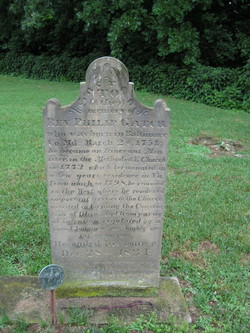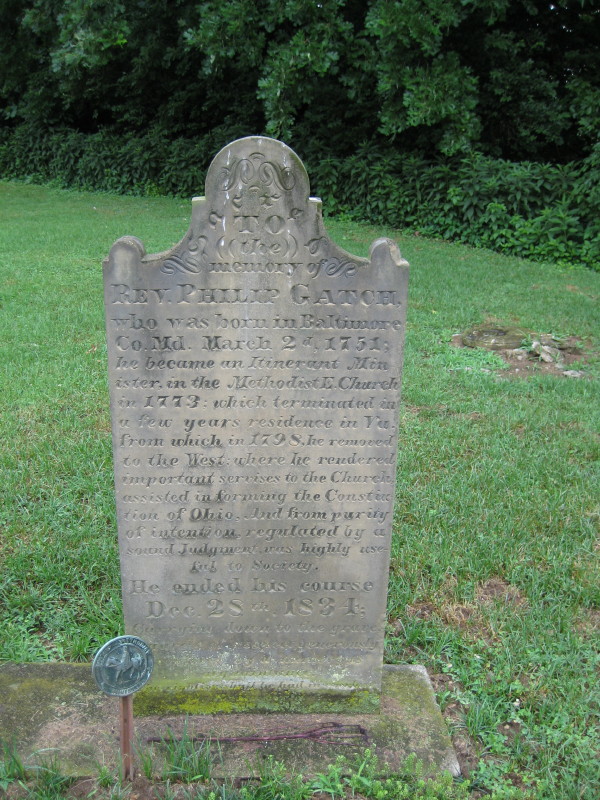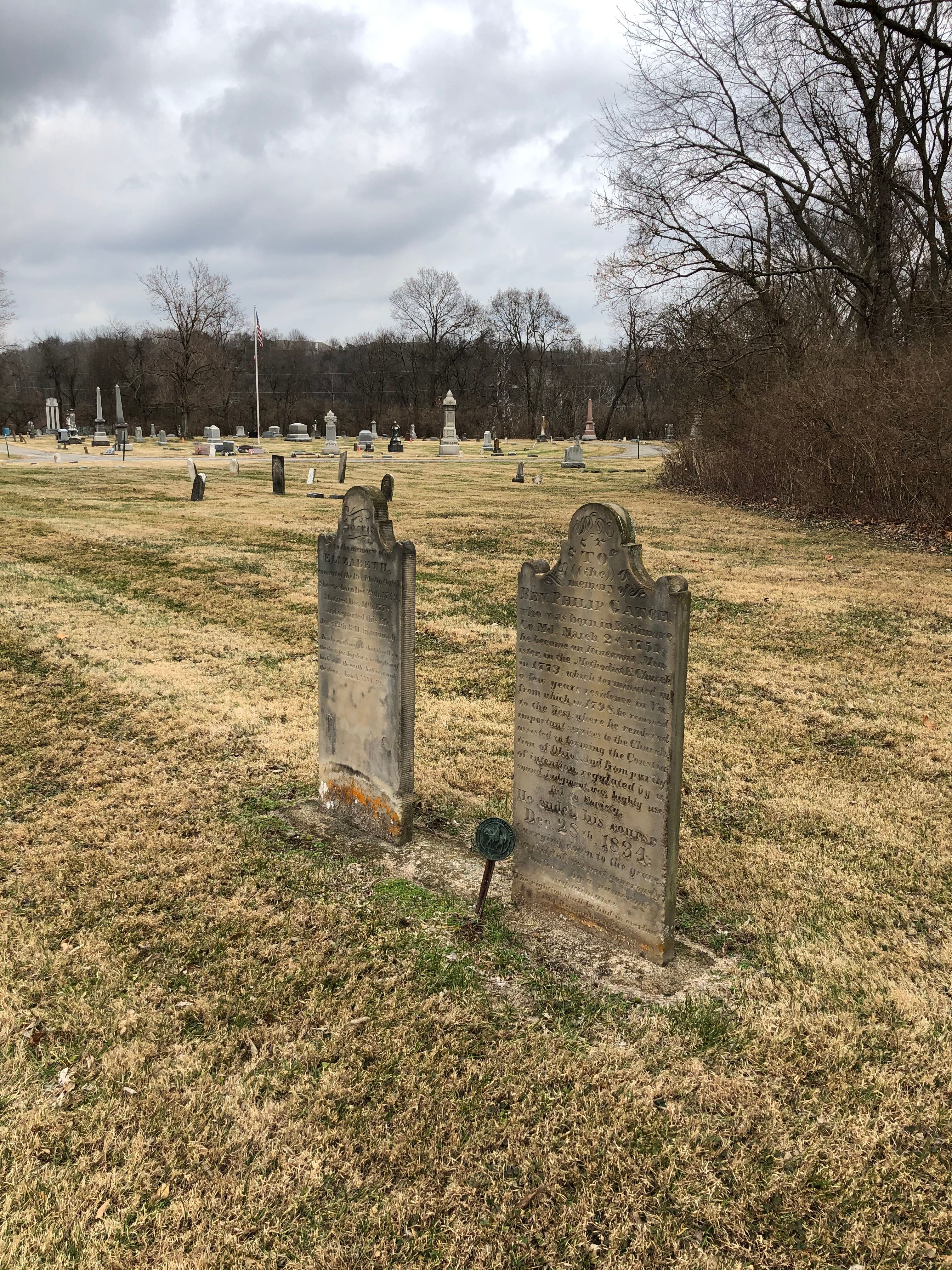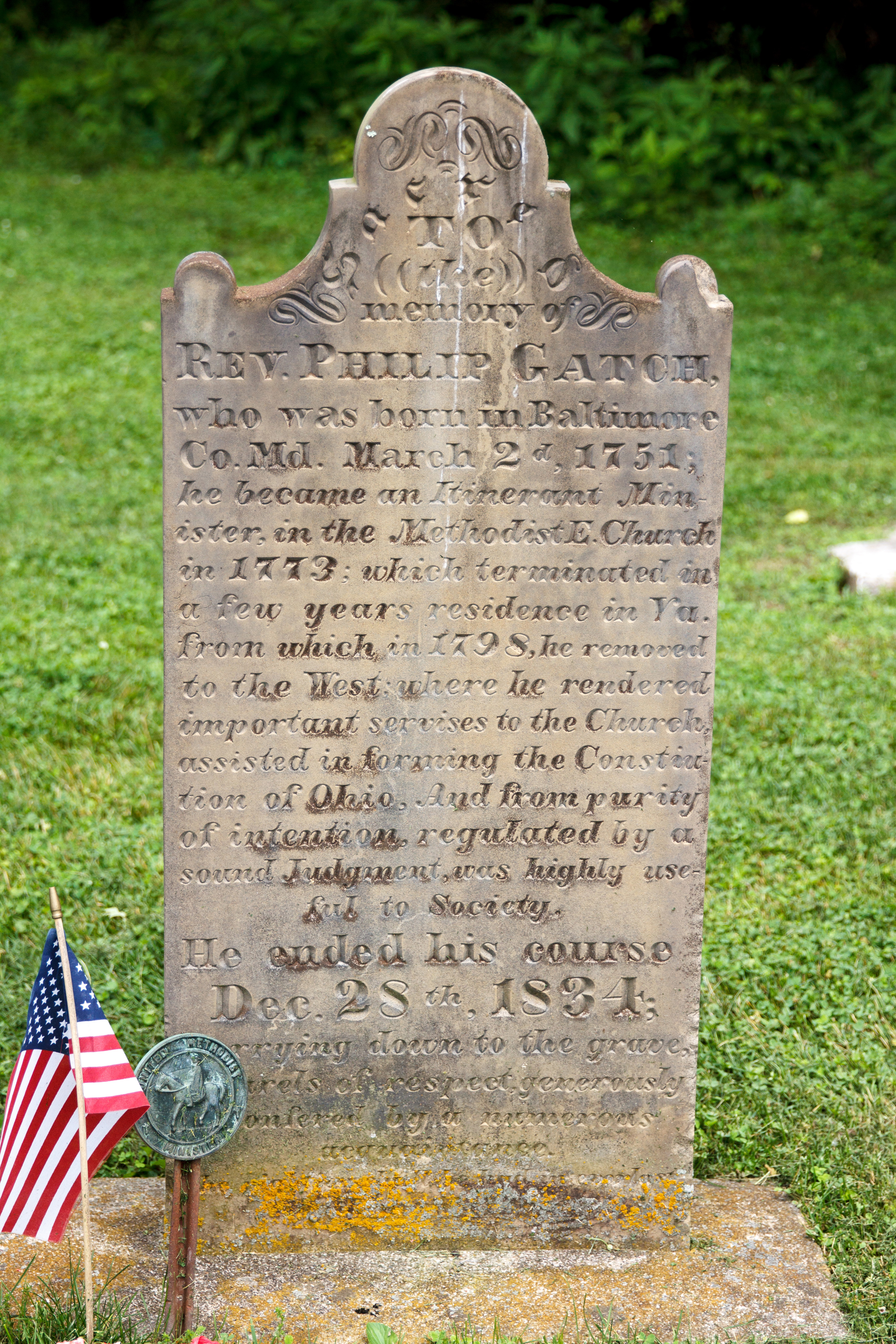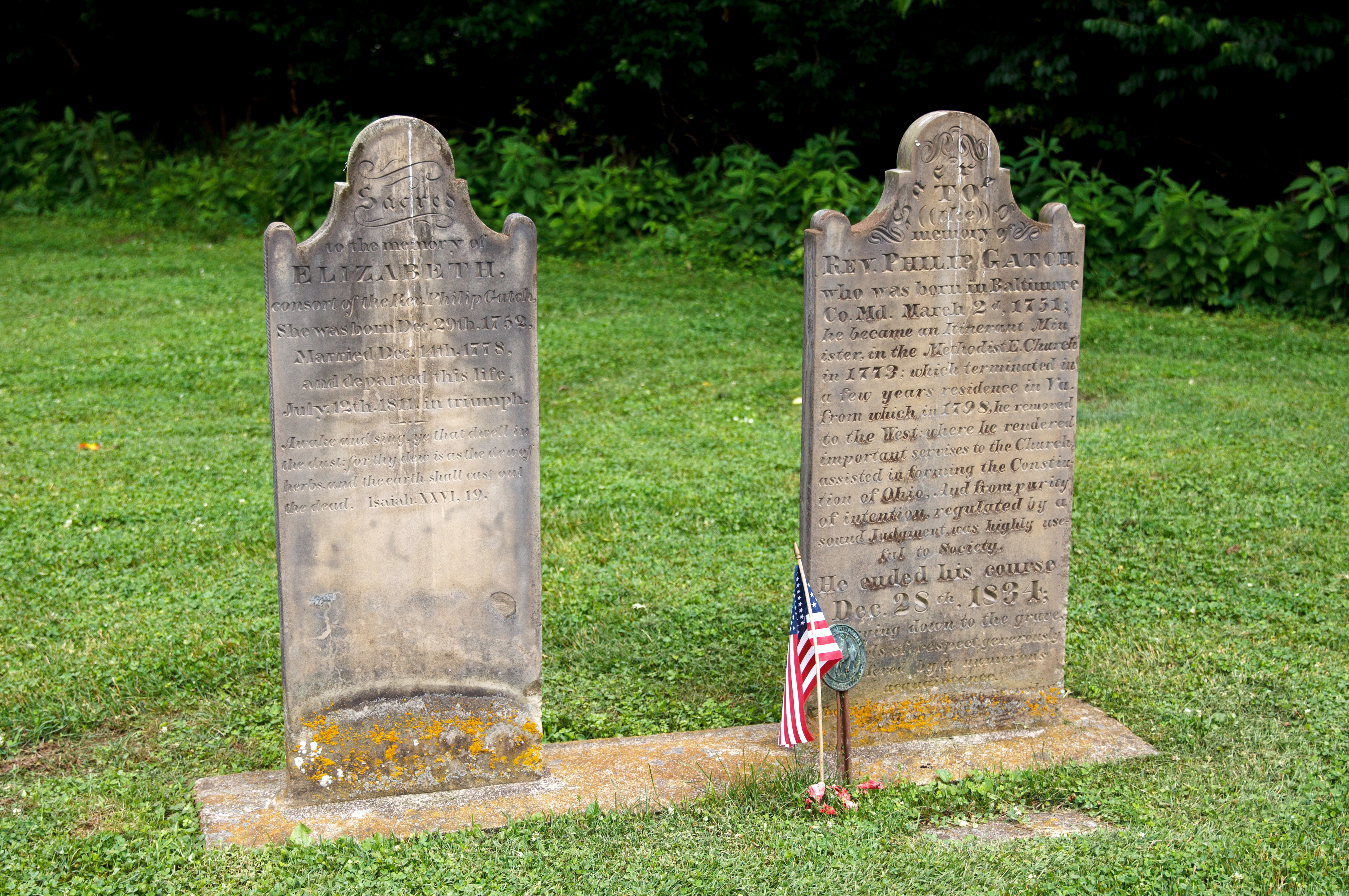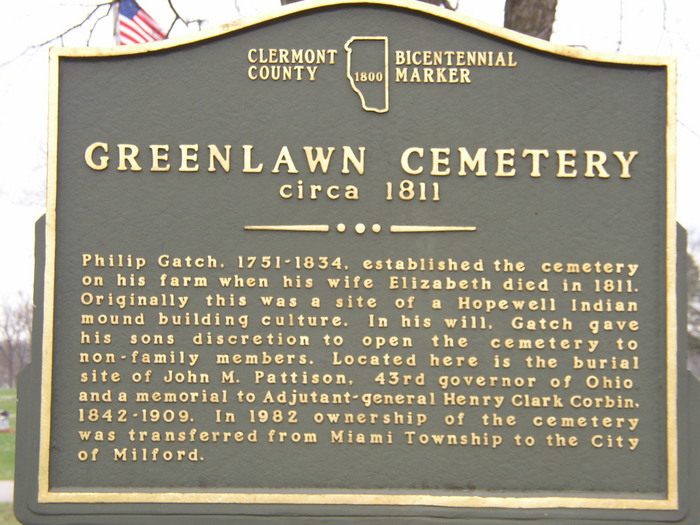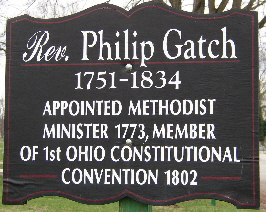The tombstone inscription states the following:
PHILIP GATCH, BORN IN BALTIMORE CO., MD. MARCH 2, 1751. HE BECAME AN ITINERANT MINISTER OF THE METHODIST CHURCH IN 1773, WHICH TERMINATED A FEW YEARS RESIDENCE IN VA. FROM WHICH IN 1798 HE REMOVED TO THE WEST, WHERE HE RENDERED IMPORTANT SERVICES TO THE CHURCH, ASSISTED IN FORMING THE CONSTITUTION OF OHIO. AND FROM PURITY OF INTENTIONS REGULATED BY A SOUND JUDGMENT, WAS HIGHLY USEFUL TO SOCIETY. HE ENDED HIS COURSE DEC 28, 1834.
The venerated name of Rev. Philip Gatch will ever be associated with the records of pioneer settlement and early religious movements in Hamilton and Clermont counties. He was one of the most remarkable men of his time in the Little Miami valley. Mr. Gatch was born near Baltimore, Maryland, March 2, 1 751, of Prussian stock on his father's side and Burgundian on his mother's. He was converted under Methodist influences in 1772; began to speak as an exhorter in the same year; the next year was sent into New Jersey as the first itinerant of the church ever sent into the State. He and the Rev. Mr. Walters, then laboring in Virginia and Delaware, were, indeed, the first preachers recruited for the Methodist itinerancy in this country. At the conference of 1774, held in Philadelphia, he was one of five received into full connection. January 14, 1788, he was married to Miss Elizabeth Smith, of Powhatan county, Virginia. After much laborious and able service at the east, part of the time under severe persecution, being often threatened, once dangerously assaulted, and once plastered with tar, he engaged in farming for a time; emancipated his slaves in December, 1780, remove d to Buckingham, Virginia, and improved a large farm. In 1798 he resolved to emigrate to the Northwest Territory, and set out for the land of hope October eleventh, of that year, with his brother-in-law, the Rev. James Smith, and family, and a near friend, Mr. Ambrose" Ransom and his family. Thirty-six persons, white and colored, were in the colony. After many tribulations, by land and water, they reached the Little Miami valley. Says Mr. Gatch in his journal:
From Williamsburg we passed on to Newtown, and for some days pitched our tents in Turpin's bottom, and there, with those who were with me, were accommodated with a small shop used by a mechanic. On Sunday morning after our arrival the boats landed. My heart was dissolved into love and gratitude to God for his care over us on our journey, and bringing us safely into this desirable and distant land. I rented a house in Newtown, and we were treated kindly by the people, though they cared little for religion. The land which I had taken in exchange for my farm in Virginia did not answer for a settlement, so I purchased a tract in the forks of the Little Miami river.
His residence in Anderson township was, therefore, brief, lasting only till the middle of the next February, when his cabin was finished and he moved beyond the East fork into it. His history thenceforth belongs mainly to Clermont county, which he served long and ably in public stations, as justice of the peace, associate judge of the court of common pleas, member of the first constitutional convention, and otherwise. He remained identified, however, with the religious interests of the lower Miami valley, preaching regularly at Newtown and other places, though not as a circuit preacher until circuits were regularly established and appointments made to them, and frequently preached thereafter. He died in the fullness of years and honors December 28, 1835, and was laid to rest beside his venerable wife, in the burying-ground upon his farm.
In this connection the following recollections of Mr. Gatch, concerning early Methodism on the Little Miami, will be read with interest:
The conference did not appoint a preacher to Miami circuit in 1800. There were at the time four or five local preachers in the Miami country, and they went everywhere preaching the word. They systematized their operations, preached not only on Sabbath, but also on other days, held two-days' meetings, and kept up a routine of quarterly meetings. They were much encouraged in seeing the pleasure of the Lord pros- per in their hands. Those popular meetings were held at different points, but most of them were held in the forks of the Miami, and it was matter of astonishment to see the numbers that attended; women would walk twenty and even thirty miles to attend them. The whole care devolved on three families; each would have frequently to provide for from fifty to a hundred people. The men at night quartered in barns and out-buildings, while the women lodged in the cabins.
It was a striking scene to witness the breaking up of one of these night meetings. The people, though coming from a distance, had no way of returning in the darkness but by dim paths or traces, some of which had been first formed by the tread of wild beasts. To obviate this difficulty they would procure fagots made of bark from the trees or splinters made fine and rendered highly combustible; these would be fired up on starting home, and in every direction they might be seen like so many meteors, bounding amid the thick forest and gilding the foliage of the loftiest trees, while the air would often be made vocal with their songs of rejoicing and praise.
Bishop McKendree, in one of his letters, speaks of a meeting at Mr. Gatch's house in June, 1802, which some women walked thirty miles to attend. A powerful revival occurred at this meeting. Another remarkable service was held in 1805, under an awning in front of Mr. Gatch's cabin, by Bishops Asbury and Whatcoat, and their travelling companion, the Rev. J. Crofford. When each of these had preached at the same service, it was insisted by Bishop Asbury that Mr. Gatch should preach also, which made four sermons in succession. And yet, says Mr. Gatch, "so precious was the word of the Lord in those days that the congregation evinced no uneasiness, but paid the greatest attention to all the discourses." He elsewhere writes : "The first circuit that was formed here extended over a tract of country from the Ohio up the Miami rivers to Mad river, and the labors of the preachers who travelled it were great. Now [1827] there are seven circuits within the bounds of the first one." The quarterly meetings were held commonly at the house of Mr. Gatch, when his patient, devoted wife would have to provide for the entertainment of fifty to one hundred persons.
SOURCE: History of Hamilton County, Ohio, with illustrations and biographical sketches
by Ford, Henry A., comp; Ford, Kate B., joint comp; Williams, L.A. & co., Cleveland, O., pub
Page 251
Publication date 1881
Publisher Cleveland, Ohio, L. A. Williams
Contributor: Mel Davis (49103460) • [email protected]
https://heritagevillagecincinnati.org/our-village/gatch-barn/
The tombstone inscription states the following:
PHILIP GATCH, BORN IN BALTIMORE CO., MD. MARCH 2, 1751. HE BECAME AN ITINERANT MINISTER OF THE METHODIST CHURCH IN 1773, WHICH TERMINATED A FEW YEARS RESIDENCE IN VA. FROM WHICH IN 1798 HE REMOVED TO THE WEST, WHERE HE RENDERED IMPORTANT SERVICES TO THE CHURCH, ASSISTED IN FORMING THE CONSTITUTION OF OHIO. AND FROM PURITY OF INTENTIONS REGULATED BY A SOUND JUDGMENT, WAS HIGHLY USEFUL TO SOCIETY. HE ENDED HIS COURSE DEC 28, 1834.
The venerated name of Rev. Philip Gatch will ever be associated with the records of pioneer settlement and early religious movements in Hamilton and Clermont counties. He was one of the most remarkable men of his time in the Little Miami valley. Mr. Gatch was born near Baltimore, Maryland, March 2, 1 751, of Prussian stock on his father's side and Burgundian on his mother's. He was converted under Methodist influences in 1772; began to speak as an exhorter in the same year; the next year was sent into New Jersey as the first itinerant of the church ever sent into the State. He and the Rev. Mr. Walters, then laboring in Virginia and Delaware, were, indeed, the first preachers recruited for the Methodist itinerancy in this country. At the conference of 1774, held in Philadelphia, he was one of five received into full connection. January 14, 1788, he was married to Miss Elizabeth Smith, of Powhatan county, Virginia. After much laborious and able service at the east, part of the time under severe persecution, being often threatened, once dangerously assaulted, and once plastered with tar, he engaged in farming for a time; emancipated his slaves in December, 1780, remove d to Buckingham, Virginia, and improved a large farm. In 1798 he resolved to emigrate to the Northwest Territory, and set out for the land of hope October eleventh, of that year, with his brother-in-law, the Rev. James Smith, and family, and a near friend, Mr. Ambrose" Ransom and his family. Thirty-six persons, white and colored, were in the colony. After many tribulations, by land and water, they reached the Little Miami valley. Says Mr. Gatch in his journal:
From Williamsburg we passed on to Newtown, and for some days pitched our tents in Turpin's bottom, and there, with those who were with me, were accommodated with a small shop used by a mechanic. On Sunday morning after our arrival the boats landed. My heart was dissolved into love and gratitude to God for his care over us on our journey, and bringing us safely into this desirable and distant land. I rented a house in Newtown, and we were treated kindly by the people, though they cared little for religion. The land which I had taken in exchange for my farm in Virginia did not answer for a settlement, so I purchased a tract in the forks of the Little Miami river.
His residence in Anderson township was, therefore, brief, lasting only till the middle of the next February, when his cabin was finished and he moved beyond the East fork into it. His history thenceforth belongs mainly to Clermont county, which he served long and ably in public stations, as justice of the peace, associate judge of the court of common pleas, member of the first constitutional convention, and otherwise. He remained identified, however, with the religious interests of the lower Miami valley, preaching regularly at Newtown and other places, though not as a circuit preacher until circuits were regularly established and appointments made to them, and frequently preached thereafter. He died in the fullness of years and honors December 28, 1835, and was laid to rest beside his venerable wife, in the burying-ground upon his farm.
In this connection the following recollections of Mr. Gatch, concerning early Methodism on the Little Miami, will be read with interest:
The conference did not appoint a preacher to Miami circuit in 1800. There were at the time four or five local preachers in the Miami country, and they went everywhere preaching the word. They systematized their operations, preached not only on Sabbath, but also on other days, held two-days' meetings, and kept up a routine of quarterly meetings. They were much encouraged in seeing the pleasure of the Lord pros- per in their hands. Those popular meetings were held at different points, but most of them were held in the forks of the Miami, and it was matter of astonishment to see the numbers that attended; women would walk twenty and even thirty miles to attend them. The whole care devolved on three families; each would have frequently to provide for from fifty to a hundred people. The men at night quartered in barns and out-buildings, while the women lodged in the cabins.
It was a striking scene to witness the breaking up of one of these night meetings. The people, though coming from a distance, had no way of returning in the darkness but by dim paths or traces, some of which had been first formed by the tread of wild beasts. To obviate this difficulty they would procure fagots made of bark from the trees or splinters made fine and rendered highly combustible; these would be fired up on starting home, and in every direction they might be seen like so many meteors, bounding amid the thick forest and gilding the foliage of the loftiest trees, while the air would often be made vocal with their songs of rejoicing and praise.
Bishop McKendree, in one of his letters, speaks of a meeting at Mr. Gatch's house in June, 1802, which some women walked thirty miles to attend. A powerful revival occurred at this meeting. Another remarkable service was held in 1805, under an awning in front of Mr. Gatch's cabin, by Bishops Asbury and Whatcoat, and their travelling companion, the Rev. J. Crofford. When each of these had preached at the same service, it was insisted by Bishop Asbury that Mr. Gatch should preach also, which made four sermons in succession. And yet, says Mr. Gatch, "so precious was the word of the Lord in those days that the congregation evinced no uneasiness, but paid the greatest attention to all the discourses." He elsewhere writes : "The first circuit that was formed here extended over a tract of country from the Ohio up the Miami rivers to Mad river, and the labors of the preachers who travelled it were great. Now [1827] there are seven circuits within the bounds of the first one." The quarterly meetings were held commonly at the house of Mr. Gatch, when his patient, devoted wife would have to provide for the entertainment of fifty to one hundred persons.
SOURCE: History of Hamilton County, Ohio, with illustrations and biographical sketches
by Ford, Henry A., comp; Ford, Kate B., joint comp; Williams, L.A. & co., Cleveland, O., pub
Page 251
Publication date 1881
Publisher Cleveland, Ohio, L. A. Williams
Contributor: Mel Davis (49103460) • [email protected]
https://heritagevillagecincinnati.org/our-village/gatch-barn/
Family Members
Advertisement
Advertisement
